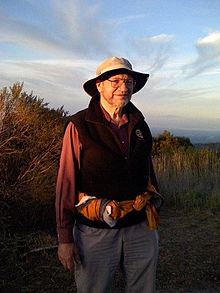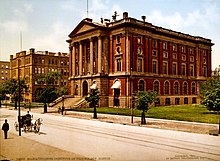1970 ⟶ Winston's ARCH Program Learns Concepts from Blocks
Patrick Winston's PhD program, ARCH, at MIT learned concepts...Year
1963
1964
1965
1969
1970
1971
❓ SIR Program for Question-Answering Systems
Bertram Raphael's MIT dissertation on the SIR program demonstrates the power of a logical representation of knowledge for question-answering systems.⟶

Question AnsweringKnowledge RepresentationSIRBertram RaphaelMITLogical Representation
 United States
United States💬 ELIZA: Interactive Dialogue Program
Joseph Weizenbaum (MIT) built ELIZA, an Interactive program that carries on a dialogue in English language on any topic. It was a popular toy at AI centers on the ARPANET when a version that "simulated" the dialogue of a psychotherapist was programmed.⟶

Natural Language ProcessingDialogue SystemsChatbotPsychotherapyMITWeizenbaumARPANETEarly AI
 United States
United States🤔 McCarthy and Hayes Discuss the Frame Problem
McCarthy and Hayes started the discussion about the Frame problem with their essay, "Some Philosophical Problems from the Standpoint of Artificial Intelligence".⟶
Frame ProblemKnowledge RepresentationPhilosophy of AICognitive ScienceMcCarthyHayesEarly AIFoundational Concepts
 USA
USA🧱 Winston's ARCH Program Learns Concepts from Blocks
Patrick Winston's PhD program, ARCH, at MIT learned concepts from examples in the world of children's blocks.⟶

Machine LearningConcept LearningBlocks WorldPatrick WinstonEarly AIMITKnowledge Representation
 USA
USA🤖 Winograd's SHRDLU Demonstrates Language Understanding in a Blocks World
Terry Winograd's PhD thesis (MIT) demonstrated the ability of computers to understand English sentences in a restricted world of children's blocks, in a coupling of his language understanding program, SHRDLU, with a robot arm that carried out instructions typed in English.⟶

Natural Language ProcessingBlocks WorldSHRDLULanguage UnderstandingRoboticsTerry WinogradMITEarly Demonstrations
 USA
USA